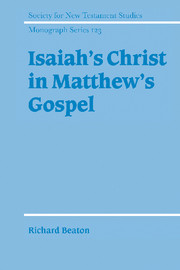Book contents
- Frontmatter
- Contents
- Preface
- List of abbreviations
- 1 Introduction
- 2 History of research
- 3 Texts and early Jewish exegesis
- 4 Isaianic formula quotations in Matthew
- 5 Isaiah 42.1–4 within the context of Matthew 11–13
- 6 The christological contribution of Isaiah 42.1–4
- 7 Conclusion
- Bibliography
- Index of passages
- Index of modern authors
- Index of subjects
7 - Conclusion
Published online by Cambridge University Press: 22 September 2009
- Frontmatter
- Contents
- Preface
- List of abbreviations
- 1 Introduction
- 2 History of research
- 3 Texts and early Jewish exegesis
- 4 Isaianic formula quotations in Matthew
- 5 Isaiah 42.1–4 within the context of Matthew 11–13
- 6 The christological contribution of Isaiah 42.1–4
- 7 Conclusion
- Bibliography
- Index of passages
- Index of modern authors
- Index of subjects
Summary
This study began with a somewhat modest goal, namely, to explore the function and possible import of Isa. 42.1–4 within Matthew's narrative and christology. In so doing, however, I have arrived at several unexpected conclusions while at the same time confirming the conclusions of numerous recent studies on Matthew's use of the Old Testament which contend that, for many of the formula quotations at least, Matthew's employment of the Old Testament is fundamentally theological and best described as complex. With regard to Isa. 42.1–4, it seems that the quotation was employed by Matthew to validate a particular view of Jesus as royal messiah, namely, that he was the Spirit-endowed, compassionate servant of the Lord whose words and deeds evinced the justice anticipated with the advent of the messiah and the inauguration of the Kingdom of God. That such is the case became evident on the level of the citation's text-form, its role within the surrounding context, and the rhetorical thrust of its final form.
For a considerable period of time, the primary avenue into the topic of Matthew's OT usage in the formula quotations has been through proposed relationships between the anomalous text-form and Matthew's own interests, assuming that Matthew, or his school, produced a type of Targum or version of the passage. The text-form was thought to provide a clear view of Matthew's theological interests. The results of this study have both modified and further supported this approach.
- Type
- Chapter
- Information
- Isaiah's Christ in Matthew's Gospel , pp. 192 - 197Publisher: Cambridge University PressPrint publication year: 2002



